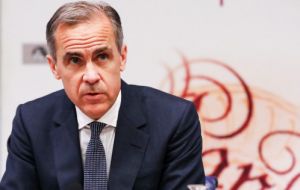MercoPress. South Atlantic News Agency
Bank of England's first interest rate increase in a decade; Brexit impact hovers over future decisions
 With the economy growing at rates above its speed limit, inflation is unlikely to return to 2% target without some increase in rates, said Governor Mark Carney.
With the economy growing at rates above its speed limit, inflation is unlikely to return to 2% target without some increase in rates, said Governor Mark Carney. The Bank of England has raised interest rates for the first time in a decade to contain an increase in inflation stoked by the Brexit vote, in what is otherwise a moment of high uncertainty for the economy. In a statement Thursday, the bank said it had lifted its benchmark rate, which affects the cost of loans and savings rates in the wider economy, to 0.50% from the record low of 0.25%.
The hike, which had been widely anticipated in financial markets, is the first since July 2007, when world credit markets started to freeze up in what would prove to be the prelude to the global financial crisis.
However, the impact on households and companies will likely be modest, as 60% of home-owners are on fixed-rate mortgages and the cost of borrowing remains very low by historical standards. A decade ago, for example, the key rate was hiked to 5.75%.
Minutes of the meeting showed that seven members of the nine-strong Monetary Policy Committee judged it “appropriate to tighten modestly the stance of monetary policy” to return inflation to target.
Inflation, according to the central bank's quarterly projections, should fall towards target, to 2.1%, in three years, if interest rates rise in the way markets expect, to 1 percent over that period.
Despite the hike, the majority on the bank's committee argued that “monetary policy continues to provide significant support to jobs and activity in the current exceptional circumstances” and that future increases should be gradual and limited.
“In many respects, the decision today is straightforward: with inflation high, slack disappearing, and the economy growing at rates above its speed limit, inflation is unlikely to return to the 2 percent target without some increase in rates,” said Bank of England Governor Mark Carney.
In spite of that backdrop, rate-setters were faced with a dilemma as the British economy has come off the boil. It is the slowest-growing among its peers in the Group of Seven industrialized democracies and businesses and households are becoming more cautious amid uncertainty over Britain's future relations with the other 27 EU nations.
It's largely because of the uncertainty surrounding Brexit that few in financial markets think the Bank of England will swiftly follow up this rate hike with another.
All that could change, Carney indicated, if Britain is quick in getting a Brexit deal with the remaining 27 EU nations. Though Britain is officially due to leave the EU in March 2019, there is mounting pressure on the government to provide businesses with some clarity on the future following Brexit day. Many financial firms, for example, have threatened to start implementing contingency plans to set up operations in Europe or move staff and activities in the early months of next year if there is no progress in the Brexit talks.
“Of course, these are not normal times,” Carney said. “Any resolution of the uncertainty about the nature of, and transition, to, the U.K.'s future relationship with the EU insofar as it affects the behavior of households, businesses and financial market participants would prompt a reassessment of the economic outlook.”
Brexit, he added, is the “biggest determinant” of the British economy's outlook.
Inflation has been boosted in the past year by the pound's 15% fall since the Brexit vote in June last year, which raised the cost of imported goods like food and energy. That impact is a one-off, the bank conceded, and is likely to fade in coming months while higher wages and productivity grow.
For two of the rate-setters, Jon Cunliffe and Dave Ramsden, there was insufficient evidence that domestic factors like wage increases would be as strong as anticipated, and that's why they voted to keep rates on hold.




Top Comments
Disclaimer & comment rules-

-

-

Read all commentsImmediate increase in mortgage interest payments but no increase in rates paid to savers. Banksters, pigs and trough spring to mind.
Nov 03rd, 2017 - 08:40 am 0TV
Nov 03rd, 2017 - 05:35 pm 0As you say, my Nationwide account pays 0.1% interest. So, over 8 years it has lost over 30% against inflation. It would have been better buying premium Bonds, one small win would have paid more than 8 years interest and I could still get all my money back..
Only way Clyde buy at least 20 different High Yield shares in ISAs to get 4.5% tax free. Avoid the banksters and so called financial advisors at all costs.
Nov 03rd, 2017 - 08:19 pm 0Commenting for this story is now closed.
If you have a Facebook account, become a fan and comment on our Facebook Page!